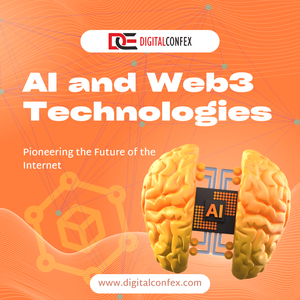AI and Web3 Technologies: Pioneering the Future of the Internet
Body
In the ever-evolving landscape of technology, two transformative forces are shaping the future of the internet: Artificial Intelligence (AI) and Web3 technologies. These advancements promise to revolutionize how we interact with data, conduct transactions, and decentralize digital ecosystems. Let’s delve into the world of AI and Web3, exploring their advantages, disadvantages, and the profound impact they’re poised to have on society.
Advantages of AI in Web3
Artificial Intelligence has already made significant strides in enhancing various aspects of Web3 technologies:
1. Enhanced Personalization: AI algorithms can analyze vast amounts of user data in Web3 environments to deliver highly personalized experiences. This could range from tailored content recommendations on decentralized platforms to personalized financial advice based on individual spending patterns.
2. Autonomous Decision Making: Smart contracts powered by AI can autonomously execute predefined conditions on decentralized networks, ensuring transparency and efficiency in transactions. This reduces the need for intermediaries and minimizes human error.
3. Predictive Analytics: AI-driven predictive models can anticipate market trends and optimize resource allocation within decentralized networks. This capability is invaluable for improving efficiency and maximizing returns in sectors like decentralized finance (DeFi).
4. Security Enhancement: AI algorithms are adept at identifying and mitigating cybersecurity threats in real-time, which is crucial in decentralized networks where data integrity and privacy are paramount.
Disadvantages of AI in Web3
However, integrating AI with Web3 technologies also poses several challenges:
1. Data Privacy Concerns: AI’s reliance on vast amounts of data raises significant privacy concerns, especially in decentralized environments where data ownership and control mechanisms are still evolving.
2. Centralization Risks: Ironically, AI’s role in optimizing processes within Web3 networks could inadvertently lead to centralization if certain nodes or entities control the majority of AI-driven operations.
3. Bias and Fairness Issues: AI algorithms can perpetuate biases present in training data, leading to unfair outcomes in decentralized applications (DApps) and smart contracts. Ensuring fairness and transparency in AI decision-making remains a critical challenge.
4. Complexity and Scalability: Implementing AI in Web3 environments requires sophisticated infrastructure and expertise, which may pose scalability challenges for smaller projects and startups.
Advantages of Web3 Technologies
Web3, often referred to as the decentralized web, offers several transformative advantages:
1. Elimination of Intermediaries: By leveraging blockchain technology, Web3 eliminates intermediaries in transactions, reducing costs and enhancing efficiency.
2. Data Ownership and Control: Users have greater control over their data in Web3 environments, as blockchain-based systems allow for secure and transparent data management.
3. Global Accessibility: Web3 technologies enable global participation without the barriers imposed by traditional financial systems, empowering individuals in underserved regions.
4. Innovation and Collaboration: Decentralized platforms foster innovation by enabling collaboration on a global scale, facilitating the development of novel applications and solutions.
Disadvantages of Web3 Technologies
Nevertheless, challenges persist in the adoption and implementation of Web3 technologies:
1. Scalability Issues: Blockchain networks face scalability limitations, resulting in slower transaction speeds and higher costs during periods of network congestion.
2. Regulatory Uncertainty: The regulatory landscape surrounding cryptocurrencies and decentralized applications is still evolving, posing legal challenges and compliance issues.
3. Energy Consumption: Proof-of-Work (PoW) consensus mechanisms, used by some blockchain networks, consume significant energy resources, raising concerns about environmental sustainability.
4. User Experience: The user experience of decentralized applications often lags behind centralized counterparts, requiring improvements in usability and accessibility.
The Future Intersection of AI and Web3
Looking ahead, the convergence of AI and Web3 technologies holds immense promise. For instance, AI-powered decentralized autonomous organizations (DAOs) could revolutionize governance structures, ensuring transparency and efficiency. Moreover, AI-driven predictive analytics could optimize resource allocation within decentralized finance (DeFi), enabling more informed investment decisions.
However, realizing this vision requires addressing key technical, ethical, and regulatory challenges. Developers and stakeholders must collaborate to enhance scalability, mitigate biases in AI algorithms, and establish robust data privacy frameworks. Regulatory frameworks need to evolve to foster innovation while safeguarding consumer rights and financial stability.
Join us at the Digital Marketing, Advertising, and Technology Confex to gain essential knowledge on the transformative impact of AI and Web3 technologies. This conference will provide deep insights into how AI enhances marketing strategies and customer engagement, while Web3 reshapes digital advertising with decentralized solutions. Through expert-led sessions, interactive workshops, and panel discussions, you’ll learn how these cutting-edge technologies can drive innovation and success in the rapidly evolving digital landscape. Don’t miss this opportunity to stay ahead and leverage AI and Web3 for future growth.
In conclusion, AI and Web3 technologies are poised to reshape the internet, offering unprecedented opportunities for innovation, transparency, and inclusivity. As these technologies continue to evolve, balancing their advantages with ethical considerations and addressing inherent challenges will be crucial. By harnessing the synergies between AI and Web3, we can pave the way for a more decentralized, intelligent, and equitable digital future.













Comments